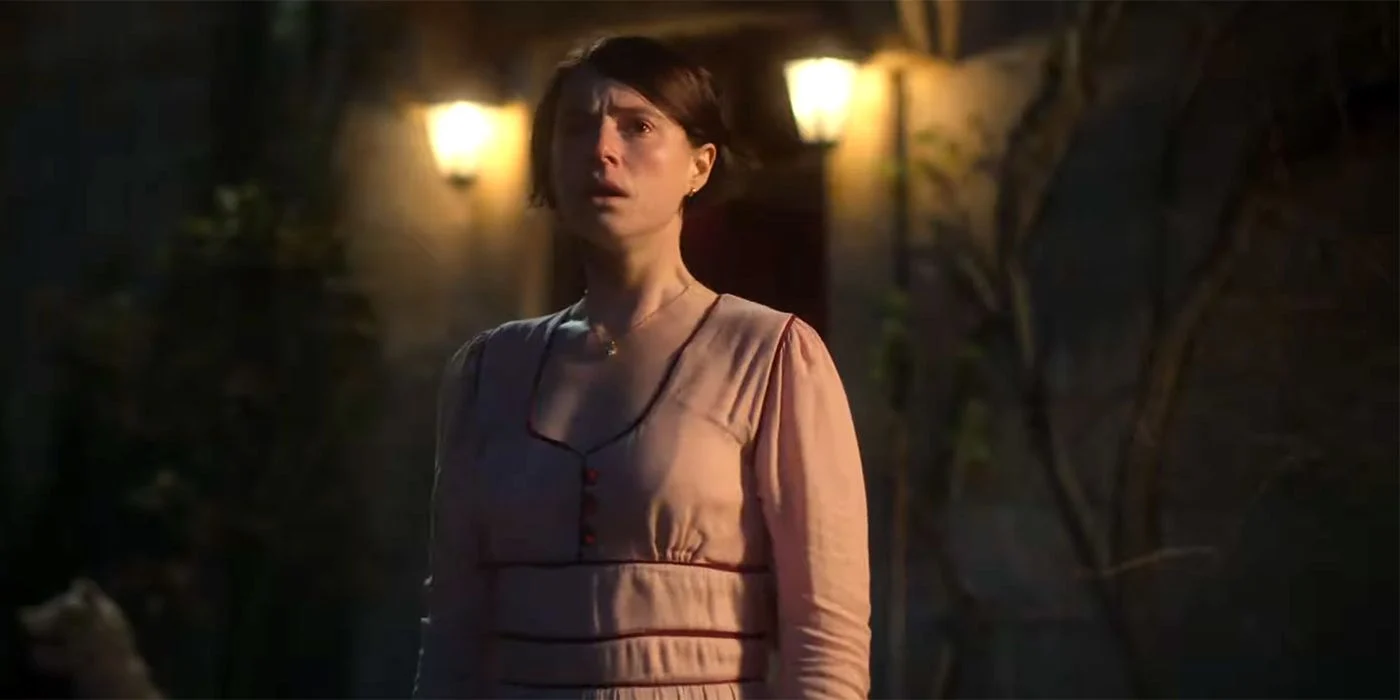
Director Alex Garland has quickly established himself as a skillful writer/director of science fiction with films such as Ex Machina and Annihilation. He makes his anticipated return to the big screen, this time returning to the horror genre.
Men introduces us to Harper (Jessie Buckley) who has absconded to the English countryside in the wake of the tragic and traumatic loss of her husband James (Paapa Essiedu). Her awkward but kind host Geoffrey (Rory Kinnear) welcomes her to the large cottage she will be calling home while she clears her mind. After exploring the surrounding area however, Harper soon encounters a strange man who seems to be stalking her. She soon finds herself battling a host of men who seem at once familiar but also strange.
The thematic text (there’s a reason that doesn’t say subtext) of the film centers around misogyny and the role that all men play in perpetuating the toxic cycle that keeps it afloat. Garland attempts to be high-minded and metaphorical about this, employing Kinnear to physically embody the complicity that all men have in the systemic oppression of women. The actor frequently encounters Buckley’s Harper throughout the tiny village, each time displaying sexist, damaging traits like gaslighting, indifference, or outright violence through one of his ten different characters. While Rory capably portrays each version of a toxically masculine male, the extended metaphor is simultaneously loud and on the nose without offering much in a new take on the criticism of the issue. We are treated with examples of the problem with toxic masculinity and how women are affected, but the metaphor of it being present in men as a gender so prevalently that even if women encounter different men it feels as if she’s constantly meeting the same man is done so obviously that it feels as if Men is simply preaching to the converted, the rest of the audience be damned. Tackling such an oft-explored topic that feels so obvious at this point requires a cleverness and inventiveness that just isn’t present here.
Such is becoming the case with “elevated” horror, high-minded, sociologically exploring horror films intended to provoke thoughtfulness as much as fright. As I’ve previously written in regards to the “Racism is the true horror!” variant of this subgenre, this well has been visited so often over the past decade, it’s beginning to feel rote and transparent. Thought-provoking cinema is when the medium is often at its best, but when filmmakers venture away from presenting audiences with questions to ponder and more toward either reinforcing their beliefs or telling stories in ways that lead them toward the thought processes you want them to have, you’re simply left with preachy art, some of the worst at engaging those you wish to reach.
Men not connecting entirely is no fault of its actors as Jessie Buckley and Rory Kinnear play their roles effectively, displaying the requisite emotion called for from script to screen. Buckley’s portrayal of a woman haunted by the emotional abuse of her deceased husband is convincing in her ability to convey how the trauma bubbles underneath the surface, always lingering and ready to hit her and boil over whenever she has a quiet moment alone. Kinnear’s portrayal of the various types of leacherous men is appropriately creepy and unsettling as well as skillfully varied with how differently he portrays each. Kinnear is obliviously and passively dismissive when one character calls for it to menacing and threatening for the next. The makeup and VFX teams assist, but Kinnear uses his skill to do a lot of the heavy lifting.
Despite the quality performances from its actors and some lush shots of the English countryside, Men ultimately feels like a slog, heavy-handed entry in a subgenre of horror that is quickly becoming defined by such films. It attempts to an explore a topic that is already hotly contested throughout society, but not in a way that sets it apart from other conversations. The drift toward preachiness may heighten its flaws and ambitious aspects, most notably an intense and highly metaphorical climax that feels like the apex of its obviousness. Ultimately, the film succeeds in making its point plain to the audience, which is why it feels like a miss overall.

